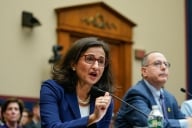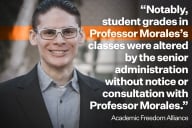You have /5 articles left.
Sign up for a free account or log in.
In many quarters within American higher education, Education Secretary Margaret Spellings is viewed (unfairly, she and her supporters would argue) as an almost single-minded advocate for more, and more standardized, measurement of how well college students are educated. The position of Spellings's Education Department on testing has made her unpopular with many college leaders and faculty members in the United States.
Which may make all the more surprising the fact that on the world stage, the U.S. Education Department is reacting with indifference, and in many cases outright skepticism, to the idea of creating an international test of higher education learning, which is being considered by the Organisation for Economic Cooperation and Development. The OECD has been in discussions for more than a year about creating what some have described as a higher education version of OECD’s Program for International Student Assessment exam for 15-year-olds, aimed at providing “stakeholders like higher education institutions, governments, students and employers with better information on what undergraduate degree students know and can do,” as OECD documents say.
Higher education officials have expressed significant reservations about creating such a test. In a letter to the OECD last month, the American Council on Education said such the results of such a measurement system would most likely be used to rank institutions, even though officials of the international group have strongly asserted that that is not their intention.
This is problematic, wrote the council’s president, David Ward, because of highly variable missions and financing systems of different college systems. “Policymakers will undoubtedly be inclined to use the results in ways that will disadvantage those institutions that do not perform well against others, possibly for reasons over which they have no control,” Ward said.
U.S. government officials as well as representatives of American testing organizations have participated in the OECD discussions, which are supposed to come to a head later this week at a meeting in Paris, where its education policy committee is expected to decide whether to proceed with a feasibility study on higher education assessment. Last week, at the urging of American college leaders, the Education Department arranged a discussion between OECD officials and college representatives about the idea of an international measurement system.
Officials familiar with the discussions said that higher education leaders voiced their concerns in no uncertain terms, and that Education Department experts expressed their own reservations about the feasibility of developing a single mechanism for assessing and comparing the performance of highly varied higher education systems.
College leaders said they were heartened that department officials were not embracing the OECD push with open arms.
"I came out of the meeting with the sense that the department was pretty much on the same sheet as many of the rest of us," said Susan Hattan, a senior consultant with the National Association of Independent Colleges and Universities, who was among those at last week's meeting. While department officials made clear that they wanted colleges to continue to develop new and better ways to measure how well their students are learning, "I detected, at least, that they were not cheerleading for the idea that, internationally, work should go into creating [a single] instrument."
In an interview, Grover J. (Russ) Whitehurst, director of the Education Department's Institute for Education Sciences and the U.S. representative on the OECD education policy committee, played down the suggestion that department officials were openly opposing the OECD's ideas.
The international organization has not defined its vision for higher education assessment, Whitehurst said, so it is "pretty hard to decide" whether to support something without knowing exactly what that something is. He said he believed there would be much more support in the department, and among higher education officials, for "multiple measures of student learning that institutions could use for self-examination and self-improvement" than for "a single instrument, high-stakes assessment for higher education."
Whitehurst acknowledged, though, that in typical OECD fashion, the organization would "look for funding from governments that are interested in participating" in the higher education project, and that "we do not anticipate, as a U.S. government, funding such a feasibility study." The Education Department's role, he said, would be limited to serving "as a broker" between institutions or organizations in the United States that are interested in participating.
Whitehurst chuckled at the suggestions from college officials that he or the Education Department have expressed strong opposition to the OECD's vision of higher education assessment.
"What you may have been tapping into is surprise [from those] who may have thought that the department is behind this" push, he said, given the department's campaign over the last two years to prod American colleges to use comparable measures of student learning, like the Collegiate Learning Assessment, to gauge and report their own learning outcomes.
"There are certainly people who may have thought that the department is going to push for internationalization of the use of something like the CLA," Whitehurst said. "And they may have been struck by the contrast between that expectation and the fact that I, as the department's surrogate, was playing an impartial role" in the conversation between the OECD and college leaders.
Perhaps, a reporter suggested, college leaders expected Whitehurst to appear at last week's meeting with pompons and a megaphone?
"Yes," he said with a laugh.








